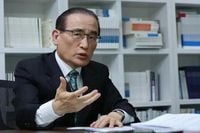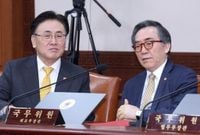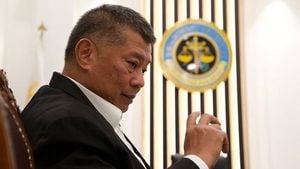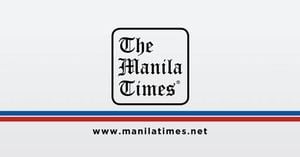As tensions mount between the United States and South Korea, concerns have arisen regarding the latter being designated a "sensitive country" by the U.S. Department of Energy (DOE). The classification stems from a recent incident involving an employee from the Idaho National Laboratory, who was dismissed after attempting to leak critical nuclear reactor diagrams to South Korea. In a press release issued on March 17, 2025, the South Korean Ministry of Foreign Affairs affirmed that this designation was primarily the result of security-related issues and was not reflective of the country's foreign policy stance.
Democratic Party lawmaker Wi Sung-lac, who has an extensive background in U.S. diplomacy and nuclear matters, shared insights into the implications of the DOE's designation. He emphasized that the U.S. would not casually designate South Korea without it being connected to security concerns around nuclear armament calls emerging under President Yoon Suk-yeol's administration. “The U.S. is not going to designate the entire country of South Korea as a ‘sensitive country’ based solely on one information leak at a laboratory,” he noted in an interview with the Hankyoreh.
Esteemed lawmaker Wi further elaborated, explaining that in the 1980s, South Korea had faced a similar designation interconnected with the Park Chung-hee administration’s attempts to develop nuclear weapons. With this historical precedent, he believes the current designation reflects a growing anxiety over South Korea's nuclear aspirations. “If we take that example into consideration, it’s reasonable to interpret the recent sensitive country designation as emerging from a context of nuclear proliferation concerns in South Korea,” he told Hankyoreh.
As South Korea braces for the implications of its new status, including procedural restrictions on the movement of up to 3,000 South Korean researchers each year who collaborate with DOE-affiliated institutions, Wi stressed the need for clear communication and diplomacy. He argued that such complications could hamper advancements in joint research and technological collaboration which are critical for both nations.
The DOE reiterated that the sensitive country designation represents the lowest level of categorization, with only routine implications. However, Wi countered that this does not change the underlying stigma attached to such a designation, particularly with the specter of heightened scrutiny over any substantial calls for nuclear armament within South Korea: “Even if its ‘other sensitive countries’ status represents the lowest sensitive country designation level, that doesn’t change the fact of South Korea being stigmatized because of nuclear proliferation concerns,” he cautioned.
On the flip side, the U.S. diplomatic mission in Korea downplayed the controversy surrounding the sensitive country label. At an event on March 18, 2025, the acting U.S. ambassador to Korea, Joseph Yun, labeled the issue a “not big deal,” suggesting the designation should not be perceived as a significant escalation in U.S.-Korea relations. “I’m just sorry that this whole thing got out of control ... as if it is a big deal. It is not a big deal,” Yun asserted while emphasizing that such designations are common and do not inherently denote an adversarial relationship between the U.S. and its partners.
Despite U.S. reassurances, South Korean officials remain alarmed. The Ministry of Foreign Affairs expressed its plans to swiftly engage in bilateral discussions with U.S. counterparts, aiming to have the designation lifted by April 15, 2025, when it is set to take effect. There's a sense among South Korea's political leadership, including Wi, that this designation might hinder diplomatic ties and technological cooperation—an essential avenue for both countries as they navigate regional challenges.
In addressing the underlying reasons for the designation, the Ministry of Foreign Affairs specified that the U.S. side attributed the move to security concerns rather than any shifts in South Korea's foreign policy. However, Jun Bong-geun, a professor emeritus at the Korea National Diplomatic Academy, raised the stakes by commenting on the complexities of having a key ally labeled as sensitive; for both nations, this could involve potential restrictions on shared technological advancements and research compensating for concerns over any lapses in handling sensitive data.
Going forward, lawmaker Wi expressed hope that continued dialogue and negotiation could lead to Korea's removal from this sensitive list while pushing for a consensus across political lines against nuclear armament. He stressed: “Moving forward, the ruling and opposition parties need to reach a consensus about clearly rejecting the pursuit of nuclear armament and nuclear latency.” Wi also underlined the importance of revising nuclear agreements with the U.S. in order to afford South Korea greater autonomy in refining its nuclear resources for peaceful purposes.
The backdrop to all of this reflects a broader concern about nuclear proliferation and security in the region, as the diplomatic standoff between the U.S. and North Korea continues to loom over discussions of South Korea’s nuclear agency. With reports of rampant nuclear armament discussions within South Korea's political sphere, officials are carefully watching how these developments unfold—at both national and international levels. Maintaining an open channel for dialogue and trust between the U.S. and South Korea remains crucial to the resolution of this sensitive designation, as each country grapples with the balances of energy and security moving forward.






